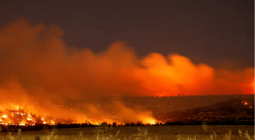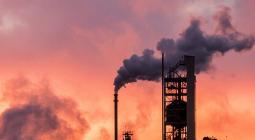Spain’s apocalyptic floods show two undeniable truths: the climate crisis is getting worse and Big Oil is killing us
The devastating flooding should spur this month’s Cop29 climate conference to press for immediate action, not look away
Move on. Nothing to see here. Just another ordinary, everyday apocalypse.
If past experience is any guide, the world’s reaction to the floods in Spain last week will be similar to that of motorway drivers at a crash scene: slow down, take in the horror, outwardly express sympathy, inwardly give thanks that fate picked someone else – and foot on the accelerator.
That is the pattern in our climate-disrupted era when extreme-weather catastrophes have become so commonplace that they risk being normalised. Instead of outrage and determination to reduce the dangers, there is an insidious sense of complacency: these things happen. Someone else is responsible. Somebody else will fix it.
Nothing could be further from the truth. The unnatural disaster in Spain – Europe’s deadliest flash floods in at least half a century – is evidence of two undeniable truths: the human-caused climate crisis is just starting to pick up ferocity, and we need to quickly kill the fossil fuel industry before it kills us.
That should be the primary message at the UN Cop29 climate summit that opens in Baku next week because halting the combustion of gas, oil, coal and trees is the only way to stabilise the climate. For this to happen, we must fight the tendency to normalise scenes of disaster.
Cars skittled like bowling pins in urban streets, cars bobbing in rivers of mud, cars turning into death traps. The images from Valencia and other regions of Spain are both shocking and familiar. In Italy last month, vehicles were swept away as roads turned to rivers. Before that, it was the turn of France, and in September, central Europe, where 24 died in floods in Poland, Austria, the Czech Republic and Slovakia. There have also been freakish downpours in England.
Of course, there have always been floods, while local factors – atmospheric, geographic, economic and political – contribute to the impact, but it is the global physics of a fossil fuel-destabilised world that is loading the dice towards disaster. The warmer the atmosphere gets, the more moisture it can hold. That means longer droughts and more intense downpours. In Spain, a year’s worth of rain was dumped in less than half a day.
“Events of this type, which used to occur many decades apart, are now becoming more frequent and their destructive capacity is greater,” said Dr Ernesto Rodríguez Camino, a senior state meteorologist and member of the Spanish Meteorological Association.
Nobody can say they were not warned. Thirty-two years have passed since governments agreed to tackle climate concerns at the first Rio de Janeiro Earth summit and nine years since the Paris Agreement to limit global heating to 1.5C above pre-industrial levels. Yet global temperatures continue to hit record highs and emissions are rising faster than the average for the past decade. In other words, the foot is still on the gas although the pile-ups are getting so close they are almost banal.
Governments continue to focus on economic speed rather than climate safety. They have been slow to reduce the risks and prepare societies, but many, including the UK, have been quick to lock up those who scream warnings and who hold up traffic. The legal system is effectively compelling citizens to accept catastrophe.
What else to call it? In recent years, apocalyptic images appear to have migrated from Hollywood disaster movies: Commuters swept off subway platforms or trapped in carriages as the waters rose up to their necks during the Zhengzhou metro line 5 flooding disaster in China , the glass wall being ripped off the side of a Vietnamese office tower during the super-typhoon Yagi, which also snapped giant wind turbines like twigs in Hainan, China. Each grotesque clip deadens the impact.
We are living in a time of unwelcome climate superlatives: the hottest two years in the world’s recorded history, the deadliest fire in the US, the biggest fire in Europe, the biggest fire in Canada, the worst drought in the Amazon rainforest. The list goes on. This is just the start. As long as people pump gases into the atmosphere, such records will be broken with increasing frequency until “worst ever” becomes our default expectation. But we should not let our baselines shift so easily. These are not isolated cases. They are part of a disturbing pattern that has been predicted by scientists and the UN. The cause is clear and so is the remedy.
The scientists at World Weather Attribution have shown on a case-by-case basis how much more intense and likely storms, droughts, floods and fires have become as a result of human-caused climate disruption. This includes the late summer flooding in the Sudan, Nigeria, Niger, Chad and Cameroon that killed more than 2,000 people and displaced millions, the torrents that left at least 244 dead in Nepal from 26-28 September, the floods in the south of Brazil that took more than 169 lives earlier in the year, as well as the devastating hurricanes - particularly Helene and Milton – in the US that killed 360 people and caused more than $100bn of damage. In every case, the poor and elderly are most vulnerable. In Spain too, many of the bodies that filled the mobile morgues are of those of old people unable to escape first floor homes and delivery drivers caught in the torrents that deluged the streets.
That all of this is already happening with just 1.3C of global heating should be an urgent warning to slash emissions, said the authors of these studies.
“At COP29 global leaders really need to agree to not only reduce, but stop burning fossil fuels, with an end date. The longer the world delays replacing fossil fuels with renewable energy, the more severe and frequent extreme weather events will become,” said Friederike Otto, Lead of World Weather Attribution at the Centre for Environmental Policy, Imperial College London.
The UN seems to be running out of vocabulary to describe how serious the danger is. UN secretary-general António Guterres has declared “code red for humanity”. UN executive climate secretary Simon Stiell has warned “we have two years to save the world.” And last week the head of the UN environment programme, Inger Andersen, insisted “It’s climate crunch time for real.”
Yet the agenda is being set by those who want to expand fossil fuel production. Azerbaijan is the third Cop host in a row, after the United Arab Emirates and Egypt, that plans to increase oil and gas production. Next year’s host Brazil also intends to boost output. So do many of the world’s richest nations This year’s talks will address how to finance a “transition away from oil and gas” – the vague goal finally accepted at Cop last year after three decades of talks.
The dissonance between this sluggish response and the apocalyptic scenes in Spain and elsewhere should be a jolt to the global consciousness. After all, the original meaning of apocalypse is revelation – lifting the cover off, laying things bare. But for that to happen, we need to truly take in and respond to the horror of what the world is going through, and stop pretending we can carry on as usual.
Cover photo: People clean the streets on the aftermath of last week’s floods in Valencia, Spain. Photograph: Manu Fernández/AP




